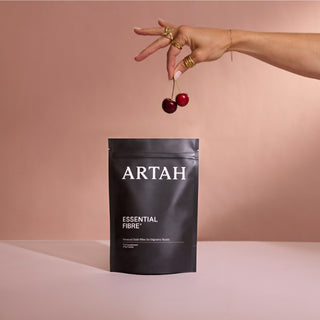Suddenly, everybody is talking about cortisol – or at least according to google trends. With searches for ‘vitamins to lower cortisol’ up 350% in the last few days, it’s clear that managing stress is still much easier said than done. When it comes to stress, it's not a one size fits all approach, however, there are some fundamental things we can do to work towards balance.
Everyone has different triggers so they will need to consider the best approach for their lifestyle, but here are some of our science-backed favourites when it comes to living that #lowcortisol life.
But first, what exactly is Cortisol?
Cortisol is a steroid hormone produced by the adrenal gland; since we produce it in response to stress, it’s often referred to as the stress hormone or fight or flight hormone, but it also plays a key regulatory role in metabolism, immunity, and more. Cortisol follows a diurnal rhythm, which means it increases when we wake to help gear us up for the day and gradually decreases by the evening to allow us to gear down for sleep. The reality, though, is that stress doesn’t follow this pattern. Cortisol is released in response to stress and isn’t discerning of the type; physical, emotional and environmental stressors (like a night of poor sleep) can all kick us into a fight or flight response.
When we’re overstimulated, we override our ability to tap into rest and repair, or parasympathetic nervous system, which is also referred to as the rest and digest system (spoiler alert – stress is a killer for gut health). In the short term, excess stress can look like this:
- Tired but wired
- Unable to focus
- Alert late in the evening
- Difficulty switches off
- Agitated
Over time, however, stress can impact virtually every aspect of health, including:
- Digestive discomfort
- IBS
- Fatigue
- Poor memory
- Disruption of the microbiome and dysbiosis
- Poor immunity
- Hormone imbalances
- Fertility issues
- Mood disruptions
- Exacerbation of pre-existing conditions
- Burnout
Here are 5 tried and tested ways to help kick you off the cortisol roller coaster:
Keep Moving
Healthy habits are often the first thing to drop when things get stressful, but buckling down on nourishing food and energising exercise when times get tough is one of the most supportive things we can do. In fact, studies show that regular exercisers and those who are physically fit secrete less cortisol in times of psychological stress – in essence, exercise can make us more resilient to constantly fluctuating cortisol. Like everything, there’s nuance, so it’s important not to push yourself to the extreme when you’re already stressed. Try shorter sessions, go phone free, try yoga, and or get into nature for a jog or brisk walk to clear your mind.
Get Serious about Sleep Support
- Lack of sleep can spike cortisol, and spiked cortisol can disrupt sleep, making it one of the most impactful ways to help support your stress resilience. Try this 5-day challenge, to help get into a positive bed-time routine.
- Switch off devices by 8pm to help reduce the urge to doomscroll, check emails, or go into a social spiral. This means you’ll need to set your alarm to make sure there’s no ‘need’ to check again. Start to reduce your exposure to unnatural light at this time by dimming your lights as well.
- Then, release physical tension with some simple yin poses. Try legs up the wall, seated forward fold, and pigeon.
- Next, try some breathwork. Start with box breath, a simple technique that involves inhaling, holding, exhaling, and holding for equal counts of 4. Start with 5 cycles and work your way up.
- Finally, end the night with a book. With the rise in social media, daily reading has dropped by a whopping 38%. If you’re using a kindle, set it to dark mode and reduce the screen’s brightness
Reduce Dietary Stress
We’re sorry to report that forgoing certain foods really can make you feel great. Studies have shown that regular consumption of ultra-processed food increases anxiety and depression, impacts brain health and increases psychological stress. Whilst the thought of changing your diet can feel stressful in itself – once you get going, it gets easier and easier to continue. Start by swapping out the worst offenders – think super sugary, chemical laden food products and UPF staples like shelf-stable white breads, baked goods and sweets. Other easy wins are sugary snacks, sweet drinks, and alcohol. Next, focus on eating real food, in its most natural form. Eating well doesn’t need to be complicated; a Mediterranean style diet that focuses on lentils, vegetables, fruit, fish, wholegrains and lean protein is the best place to start. If you prefer something more structured to start, try one of our nutrition plans, ranging from 5 to 28 days.
Support the Microbiome
Gut health and mental health are connected via a bidirectional communication system between the gut and the brain, known as the gut-brain axis. Our emotional state affects the function and stability of our gastrointestinal (GI) tract, and likewise, our GI tract affects our emotional state. The microbiome and its metabolites also direct endocrine, immune, and metabolic processes, making it an important focal point of intervention for not only those suffering from chronic symptoms and sickness, but also those looking to improve their longevity, well-being, and resilience to disease.
But if we turn our attention back to stress – the key here is feeding the good microbes with what they need to thrive. Think tons of leafy greens, different coloured fruit and vegetables, fermented foods like sauerkraut and kimchi, and lots of fibre. Probiotics can also support a healthy microbiome, with some bacteria more specific to supporting emotional health. Lactobacillus rhamnosus GG, for example, is one of the most studied strains in the world, has been shown to increase GABA production and support emotional wellbeing. Try Biome Restore, which has GG plus other brain specific strains, alongside mega mushroom Lion’s Mane.
Use Supplements Strategically
In addition to the lifestyle factors mentioned, supplements can be supportive in stressful times. Ashwagandha is probably one of the most studied adaptogens; studies have found that Ashwagandha significantly reduced subjective stress levels, reduced sleeplessness and fatigue, and reduced serum cortisol level when compared with placebo.
Other considerations:
- Foundational nutrient status is always important, but even more so when things get tough. Chronic stress depletes various vitamins and minerals and can lead to micronutrient depletion. Try a good multi-nutrient support to tick all the boxes.
- Omega-3 fats are critical for overall health but may also be of particular interest when it comes to stress. A study in 2021 showed that after four months of omega-3 supplementation, participants experienced better stress resilience, including lower cortisol, better recovery, and higher levels of telomerase activity, an enzyme that protects genetic material from damage.
- Magnesium is known as the calming mineral because of its impact on neurotransmitters, mood and energy; it has also been shown to block cortisol and reduce some of the physiological effects of stress. Try Magnesium Gylcinate, one of the best forms for the mind
Disclaimer: The information presented in this article is for educational purposes only and is not intended to diagnose, prevent, or treat any medical or psychological conditions. The information is not intended as medical advice, nor should it replace the advice from a doctor or qualified healthcare professional. Please do not stop, adjust, or modify your dose of any prescribed medications without the direct supervision of your healthcare practitioner.



















































